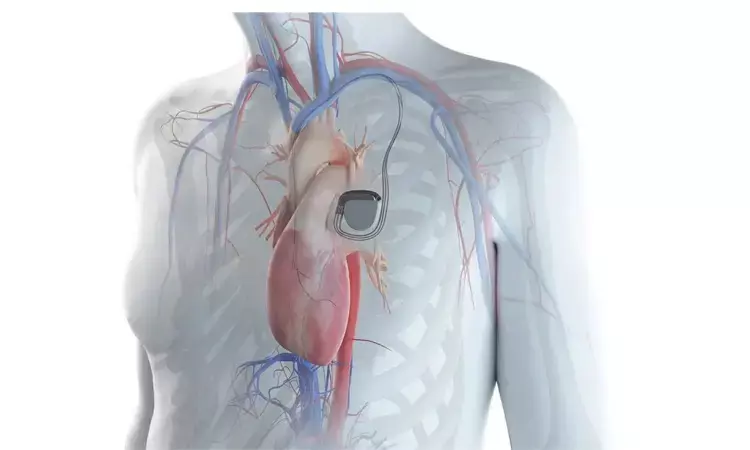- Home
- Medical news & Guidelines
- Anesthesiology
- Cardiology and CTVS
- Critical Care
- Dentistry
- Dermatology
- Diabetes and Endocrinology
- ENT
- Gastroenterology
- Medicine
- Nephrology
- Neurology
- Obstretics-Gynaecology
- Oncology
- Ophthalmology
- Orthopaedics
- Pediatrics-Neonatology
- Psychiatry
- Pulmonology
- Radiology
- Surgery
- Urology
- Laboratory Medicine
- Diet
- Nursing
- Paramedical
- Physiotherapy
- Health news
- Fact Check
- Bone Health Fact Check
- Brain Health Fact Check
- Cancer Related Fact Check
- Child Care Fact Check
- Dental and oral health fact check
- Diabetes and metabolic health fact check
- Diet and Nutrition Fact Check
- Eye and ENT Care Fact Check
- Fitness fact check
- Gut health fact check
- Heart health fact check
- Kidney health fact check
- Medical education fact check
- Men's health fact check
- Respiratory fact check
- Skin and hair care fact check
- Vaccine and Immunization fact check
- Women's health fact check
- AYUSH
- State News
- Andaman and Nicobar Islands
- Andhra Pradesh
- Arunachal Pradesh
- Assam
- Bihar
- Chandigarh
- Chattisgarh
- Dadra and Nagar Haveli
- Daman and Diu
- Delhi
- Goa
- Gujarat
- Haryana
- Himachal Pradesh
- Jammu & Kashmir
- Jharkhand
- Karnataka
- Kerala
- Ladakh
- Lakshadweep
- Madhya Pradesh
- Maharashtra
- Manipur
- Meghalaya
- Mizoram
- Nagaland
- Odisha
- Puducherry
- Punjab
- Rajasthan
- Sikkim
- Tamil Nadu
- Telangana
- Tripura
- Uttar Pradesh
- Uttrakhand
- West Bengal
- Medical Education
- Industry
PET imaging shows an uncommon case of thermal burns from repetitive ICD shocks: Case report

USA: A recent case study published in HeartRhythm Case Reports has described an uncommon case of thermal burn from multiple shocks resulting from implantable cardioverter defibrillators (ICDs) seen on positron emission tomography (PET)/computed tomography (CT) scans.
Christopher Perez, Department of Cardiology, Baylor Scott and White Medical Center, Temple, and colleagues described the case of a 22-year-old man who received multiple ICD defibrillations resulting in thermal injury from the device.
There has been a significant rise in the use of ICDs after clinical trials have shown their benefit in reducing mortality in selected patients with heart disease. The advantage of these devices is related to their ability to reduce SCD (sudden cardiac death) by providing anti-tachycardia pacing and high-energy shocks in malignant ventricular arrhythmias.
"First and second-degree burns can be a common side effect of external electrical therapy, such as cardioversion or defibrillation," the authors wrote in their study. "Deep dermal burns may also occur but are less common. However, skin and subcutaneous tissue injury or burns due to ICD shocks have never been reported."
The patient was hospitalized after reporting 15 shocks from an ICD after intense exercise, with the device having recorded an abnormal heart rhythm of 300 beats per minute. The patient had a history of ventricular fibrillation, myocarditis, and prior out-of-hospital cardiac arrest. Since the device implantation, the patient reported to be in good health. He also reported nonadherence to the antiarrhythmic drug sotalol.
The chest ultrasound did not reveal any evidence of fluid collection or soft tissue abnormalities; a CT scan did not reveal features of sarcoidosis or other interstitial lung diseases; and an echocardiogram showed normal heart function. Also, a cardiac MRI showed nonspecific left ventricular wall thinning reflecting infarction versus a previous infectious or inflammatory process.
A PET/CT scan was obtained to evaluate possible cardiac sarcoidosis, which showed no increased F-18 FDG radiotracer activity in the myocardium, suggesting the condition.
"Incidentally, there was increased FDG activity posterior to the ICD along the anterior left pectoralis major muscle related to inflammation from multiple ICD shocks," the authors wrote.
Finally, the patient's episode of ventricular tachycardia was suggested to be scar-mediated. On discharge, sotalol was resumed, and the patient was referred for catheter-based ablation.
ICDs are a well-established therapy for SCD prevention. Given their widespread use, more physicians will encounter patients who have received an ICD shock.
"It's important to know that multiple discharges from an ICD can lead to thermal injury of the subcutaneous tissues," the authors wrote. "Though not typically needed for management, this case highlights rare evidence of subcutaneous tissue injury on PET CT."
"Given the potential long-term adverse effects of soft tissue injury, such as functional impairment or chronic pain, further research in this area becomes essential to understand better the impact of ICD shocks on soft tissue structures and to develop effective management strategies, they suggest.
"A more comprehensive understanding of the soft tissue effects of ICD shocks can help to inform clinical practice and improve patient outcomes," the team concluded.
Reference:
Perez, C., Banchs, J. E., Strober, M. D., & Mixon, T. A. (2023). An Uncommon Case of Thermal Burn from Repetitive Implantable Cardioverter-Defibrillator Shocks Seen on Positron Emission Tomography/Computed Tomography Scan. HeartRhythm Case Reports. https://doi.org/10.1016/j.hrcr.2023.05.007
Dr Kamal Kant Kohli-MBBS, DTCD- a chest specialist with more than 30 years of practice and a flair for writing clinical articles, Dr Kamal Kant Kohli joined Medical Dialogues as a Chief Editor of Medical News. Besides writing articles, as an editor, he proofreads and verifies all the medical content published on Medical Dialogues including those coming from journals, studies,medical conferences,guidelines etc. Email: drkohli@medicaldialogues.in. Contact no. 011-43720751


